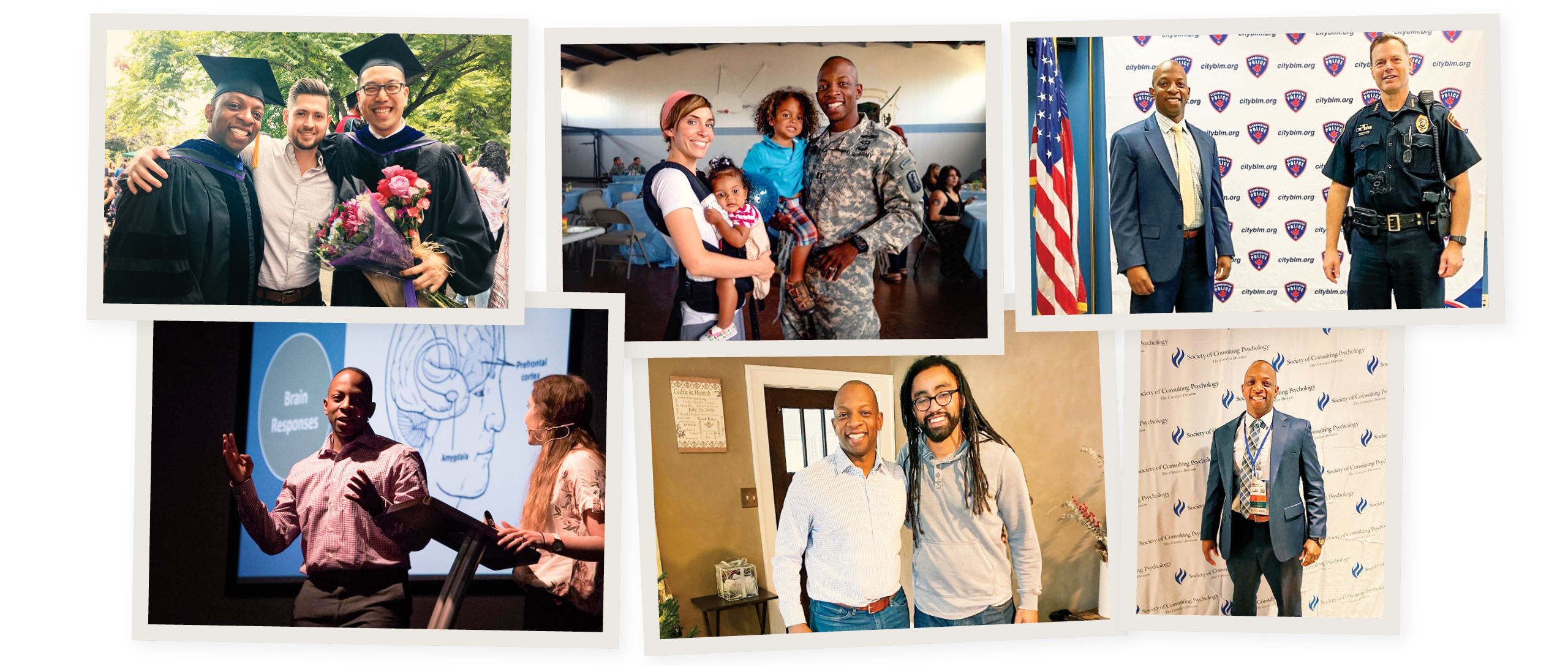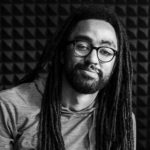
Cedric Williams (PhD ’19) tells stories about Interstate 55, the highway that runs north and south from the Great Lakes of the Midwest to the Gulf of Mexico. More important for Cedric, I-55 is the highway connecting Chicago, where his parents grew up, with Normal, Illinois, a smaller town two hours south where Cedric and his brother, Andrae, were born and raised. He remembers, when he was a child, pulling off the highway to eat at the same diner with his family on every trip. As an adult, he exits the highway on his way home from Army Reserve drills in the city to change back into civilian clothing before rejoining his family and returning to his work in Normal. Both Chicago and Normal are contexts that have taught Cedric how to overcome obstacles and be resilient, lessons that now contribute to Cedric’s work as a consulting psychologist.
Cedric’s father grew up on the South Side of Chicago in Prairie Courts, a set of projects that suffered from a lack of resources and subsequent violence. While Cedric’s dad moved his family out of Chicago to escape these conditions, Cedric remembers feeling that he was able to understand his father when they visited family in the city. “My dad understood the projects. They were a part of who he was as a person. When we would go back to Chicago, we would visit family in high-rise projects, and gangs would try to make you pay a toll to ride up the elevator,” he recalls. “I remember him being fearless. He just knew how to say, ‘No, I’m not doing that with my kids,’ and go up without paying the toll. The more I think of it, being in Chicago gave me a better depiction of what my dad was really like because he knew how to survive and be resilient.” Throughout his upbringing, Cedric felt that his dad was shaping him into a person who could endure as he did.
Normal, however, posed different challenges for Cedric. “It was interesting being a Black child in Normal, which is predominantly White,” he says. “You don’t really feel like you’re an ‘other’ until you do. And then you never forget that.” There were moments when he faced overt discrimination: “I remember Sunday school teachers saying derogatory things. Saying to me and my brother, ‘eenie, meenie, miney, mo, grab an n-word by the toe.’” Even when racist comments weren’t so direct, Cedric describes Normal as “one of those environments” where “everyone is going to be polite, we’re going to praise Jesus with you, but you absolutely will not take my daughter to homecoming.”
Directly out of high school, Cedric joined the military, which stretched the skills he had learned for surviving in challenging spaces. “The army teaches you how to go over obstacles, go around them, and problem solve. You learn from the very beginning how to persevere and become resilient. I’ve been in the infantry my entire career. It has taught me so much about enduring pain as well as uncomfortable and hostile environments.”
Serving as infantry, however, also presented trauma that Cedric hadn’t encountered before. While on active duty in Iraq, he lost two friends within a short amount of time. “When I was overseas in Iraq, that’s when I decided I wanted to become a psychologist. We were dealing with so much trauma. And there wasn’t really time to process it,” he says. “When I left I wanted to figure out a way to help those who endure suffering and pain.” After returning home, completing a bachelor’s degree, and serving as a young adult pastor at a local church, Cedric still craved an education that would better equip him to provide more substantive support for those who struggled. This led him to a PhD in Clinical Psychology at Fuller.
Both completing the coursework and living in a new context in Pasadena presented opportunities for growth for Cedric. “One of my expectations for moving was to be around different people,” he remembers. “And Fuller checked that box—the world is invited to Fuller. It was the first time I met Christians who were so drastically different from what I knew.” For instance, one of his friends began a prayer with “Mother God.” “That was the first time I ever heard God referred to as Mother!” he shares. “It might seem small, but coming from the Midwest, it was very different.”
At the same time, Cedric’s military background was perceived differently in California than it was in Normal. “Growing up in the Midwest, the military is part of the culture. It’s celebrated. At Fuller, I began meeting people who challenged my service, which caused me to think deeply about my beliefs and values,” Cedric says. Rather than receiving praise for his military background, he worried that it caused others to view him with skepticism. Despite the tension this caused internally, Cedric resolved to work through the challenge. “In order to be resilient, you have to be committed to the goal. I had the goal to graduate with my PhD; I was committed to everything involved in that.”
While he was a student at Fuller, Cedric began to dream about what he might do after graduating, writing ideas on the easel he kept in his apartment in Chang Commons. This led to Legacy Consulting & Research Group, a company he founded with other Fuller graduates, which aims to help businesses and employees learn to thrive by coaching and consulting in the areas of multicultural competence, resilience, and leadership. His dissertation on positive interpersonal relationships, occupational thriving, and psychological well-being guided the direction for Legacy. Specifically, he was looking to answer the question of which relationships contribute more to your psychological well-being: your relationships at work or your relationships with family and friends? “I found that occupational thriving, your ability to be effective and engaged at work, accounted for a larger amount of psychological well-being than your positive interpersonal relationships,” he says. “The research helped me see how serious our work is!”
Thus, Legacy has sought to contribute to people’s psychological well-being by attending to their work life. “A lot of people—many of my family members, friends, or military comrades—will never go to a therapist’s office,” says Cedric. “But if a psychologist comes and teaches them something in a work environment, they will grab onto it.”
As consulting psychologists and executive coaches, Cedric and his team have coached employers, taught multicultural competence to first responders and churches, and trained higher education faculty and staff in resilience. As a student, Cedric found the language for what he began learning from his family, practiced growing up as a minority in a Midwestern community, and further developed while serving in the army: resilience. “The thing about resilience,” he says, “is that you can always build upon it. I teach people how.”

Aaron Dorsey (MAT ’18) is formerly the communications inclusion liaison for FULLER studio. He is a PhD student at Garrett-Evangelical Theological Seminary in Evanston, IL.

Photos provided by Cedric Williams
Cedric Williams (PhD ’19) tells stories about Interstate 55, the highway that runs north and south from the Great Lakes of the Midwest to the Gulf of Mexico. More important for Cedric, I-55 is the highway connecting Chicago, where his parents grew up, with Normal, Illinois, a smaller town two hours south where Cedric and his brother, Andrae, were born and raised. He remembers, when he was a child, pulling off the highway to eat at the same diner with his family on every trip. As an adult, he exits the highway on his way home from Army Reserve drills in the city to change back into civilian clothing before rejoining his family and returning to his work in Normal. Both Chicago and Normal are contexts that have taught Cedric how to overcome obstacles and be resilient, lessons that now contribute to Cedric’s work as a consulting psychologist.
Cedric’s father grew up on the South Side of Chicago in Prairie Courts, a set of projects that suffered from a lack of resources and subsequent violence. While Cedric’s dad moved his family out of Chicago to escape these conditions, Cedric remembers feeling that he was able to understand his father when they visited family in the city. “My dad understood the projects. They were a part of who he was as a person. When we would go back to Chicago, we would visit family in high-rise projects, and gangs would try to make you pay a toll to ride up the elevator,” he recalls. “I remember him being fearless. He just knew how to say, ‘No, I’m not doing that with my kids,’ and go up without paying the toll. The more I think of it, being in Chicago gave me a better depiction of what my dad was really like because he knew how to survive and be resilient.” Throughout his upbringing, Cedric felt that his dad was shaping him into a person who could endure as he did.
Normal, however, posed different challenges for Cedric. “It was interesting being a Black child in Normal, which is predominantly White,” he says. “You don’t really feel like you’re an ‘other’ until you do. And then you never forget that.” There were moments when he faced overt discrimination: “I remember Sunday school teachers saying derogatory things. Saying to me and my brother, ‘eenie, meenie, miney, mo, grab an n-word by the toe.’” Even when racist comments weren’t so direct, Cedric describes Normal as “one of those environments” where “everyone is going to be polite, we’re going to praise Jesus with you, but you absolutely will not take my daughter to homecoming.”
Directly out of high school, Cedric joined the military, which stretched the skills he had learned for surviving in challenging spaces. “The army teaches you how to go over obstacles, go around them, and problem solve. You learn from the very beginning how to persevere and become resilient. I’ve been in the infantry my entire career. It has taught me so much about enduring pain as well as uncomfortable and hostile environments.”
Serving as infantry, however, also presented trauma that Cedric hadn’t encountered before. While on active duty in Iraq, he lost two friends within a short amount of time. “When I was overseas in Iraq, that’s when I decided I wanted to become a psychologist. We were dealing with so much trauma. And there wasn’t really time to process it,” he says. “When I left I wanted to figure out a way to help those who endure suffering and pain.” After returning home, completing a bachelor’s degree, and serving as a young adult pastor at a local church, Cedric still craved an education that would better equip him to provide more substantive support for those who struggled. This led him to a PhD in Clinical Psychology at Fuller.
Both completing the coursework and living in a new context in Pasadena presented opportunities for growth for Cedric. “One of my expectations for moving was to be around different people,” he remembers. “And Fuller checked that box—the world is invited to Fuller. It was the first time I met Christians who were so drastically different from what I knew.” For instance, one of his friends began a prayer with “Mother God.” “That was the first time I ever heard God referred to as Mother!” he shares. “It might seem small, but coming from the Midwest, it was very different.”
At the same time, Cedric’s military background was perceived differently in California than it was in Normal. “Growing up in the Midwest, the military is part of the culture. It’s celebrated. At Fuller, I began meeting people who challenged my service, which caused me to think deeply about my beliefs and values,” Cedric says. Rather than receiving praise for his military background, he worried that it caused others to view him with skepticism. Despite the tension this caused internally, Cedric resolved to work through the challenge. “In order to be resilient, you have to be committed to the goal. I had the goal to graduate with my PhD; I was committed to everything involved in that.”
While he was a student at Fuller, Cedric began to dream about what he might do after graduating, writing ideas on the easel he kept in his apartment in Chang Commons. This led to Legacy Consulting & Research Group, a company he founded with other Fuller graduates, which aims to help businesses and employees learn to thrive by coaching and consulting in the areas of multicultural competence, resilience, and leadership. His dissertation on positive interpersonal relationships, occupational thriving, and psychological well-being guided the direction for Legacy. Specifically, he was looking to answer the question of which relationships contribute more to your psychological well-being: your relationships at work or your relationships with family and friends? “I found that occupational thriving, your ability to be effective and engaged at work, accounted for a larger amount of psychological well-being than your positive interpersonal relationships,” he says. “The research helped me see how serious our work is!”
Thus, Legacy has sought to contribute to people’s psychological well-being by attending to their work life. “A lot of people—many of my family members, friends, or military comrades—will never go to a therapist’s office,” says Cedric. “But if a psychologist comes and teaches them something in a work environment, they will grab onto it.”
As consulting psychologists and executive coaches, Cedric and his team have coached employers, taught multicultural competence to first responders and churches, and trained higher education faculty and staff in resilience. As a student, Cedric found the language for what he began learning from his family, practiced growing up as a minority in a Midwestern community, and further developed while serving in the army: resilience. “The thing about resilience,” he says, “is that you can always build upon it. I teach people how.”
Aaron Dorsey (MAT ’18) is formerly the communications inclusion liaison for FULLER studio. He is a PhD student at Garrett-Evangelical Theological Seminary in Evanston, IL.
Photos provided by Cedric Williams
Mikey Master journeys from the cacao fields of Bali to a chocolate and coffee enterprise in Philadelphia, learning important lessons about international development along the way